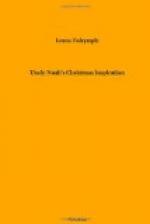“Oh, Lord,” he prayed, “save dis yere ol’ turkey gobbler. I knows, Lord, he’s a powahful wuthless bird, but he’s all I’se got. I’se jus’ an’ ol’ slave, Massa, what’s been free since de War, an’ Job, sah, he understan’s me. Lord, I doan wanta live no mo’ if I has to kill ol’ Job. Send me an inspiration, Lord, an’ tell me how I can save his wuthless ol’ hide. Save him an’—an’ God bless de Colonel! Amen.”
For an interval, in which the only sound was that of Job’s feet as he strutted about seeking an edible successor to the bread, Uncle Noah remained upon his knees in the attitude of prayer, perhaps awaiting inspiration. At length he rose, and, seating himself upon the box once more, buried his white head dejectedly in his hands. The snow-flakes filtered slowly through a crevice at the side, heaping fantastically into a miniature drift. Absently Uncle Noah watched them, his mind traveling back to many a snowy Christmas “before the War.”
Suddenly his brown face glowed with radiance and he drew a long breath of relief. “Job,” he said, leaning forward and patting the turkey, “I has it! Yoh’d scarcely believe it, sah, but I’se a-goin’ to save yoh.”
He arose transformed, the despondent droop of his lean body replaced by an alert energy. “Now, Job,” he coaxed, “I jus’ wants yoh foh to come along wif me peaceable, sah. I’se after yoh to save yoh ol’ hide from de Christmas platter.”
But Job, with a malicious enjoyment of the game, was prancing wildly about the barn, flapping his wings in hysterical derision of his breathless pursuer. Brought to bay he squawked a protest and struggled violently as Uncle Noah unceremoniously imprisoned him beneath one arm.
“There, sah,” exclaimed the negro triumphantly, “I has yoh! Yoh is sartinly the mos’ wuthless turkey on dis yere plantation.”
Tightly clasping the outraged tyrant Uncle Noah tiptoed to the lantern and blew it out. Then stumbling across the floor he stealthily left the barn and set out across the snowy fields to a tumble-down shanty, sole survivor of a string of negro huts long since burned one by one in the library fireplace. Into its dilapidated interior he thrust the protesting turkey, pausing at the door as he struck a match to view the bird’s temporary quarters.
“Now, Massa Job Fairfax,” he began, “I knows yoh is jus’ mad clean through. Yoh jus’ naturally objects to bein’ toted out in de snow in de middle o’ de turkey night ‘thout bein’ asked. Yoh says yoh back is full o’ snow? Well, I jus’ asks yoh, Massa Job Fairfax, ain’t dat better’n bein’ wifout a head? Now, sah, I asks yoh to be mos’ terrible quiet dis yere night. I’se a-goin’ into Cotesville on a little trip an’ I doan want de Colonel to know yoh here.”
He closed the rickety door, and, hurrying back across the fields, sought the kitchen, his eyes behind their spectacles shining with excitement. Muffling himself in a quaint red knitted scarf, a dingy overcoat and a worn fur cap, plentifully earlapped, he left the house again, pausing only long enough to peer through the library window at the Colonel, who was reading aloud to his wife, both drawn up in the cheery warmth of a blazing wood fire. Then he hurried on along the road to town.




